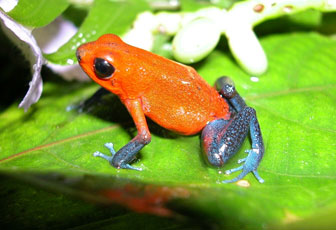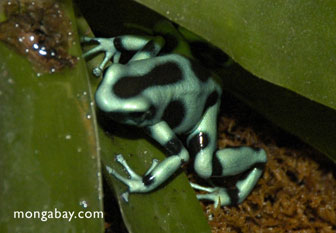Frogs avoid damaging UV-B radiation, reducing extinction risk
Frogs avoid damaging UV-B radiation, reducing extinction risk
Rhett A. Butler, mongabay.com
April 18, 2007
Poison arrow frogs appear to make special effort to avoid exposure to damaging ultraviolet-B radiation, according to research published in the journal Biotropica. The findings are significant in light of increasing levels of UV-B radiation due to ozone depletion.
UV-B radiation has been shown to increase the incidence of developmental abnormalities and may make frogs more susceptible to disease. It is believed to be one of several factors contributing to the rapid global decline in amphibians since 1980.
Working at the La Selva Biological Research Station in Costa Rica, a team of scientists led by Barbara A. Han of Oregon State University, used field enclosures and surveys of UV-B radiation levels at natural calling sites to determine the behavioral response of Dendrobates pumilio (the strawberry poison-dart frog) and D. auratus (the green poison-dart frog) to UV-B levels. The researchers found that the two species of frogs appear to be exhibiting UV-B avoidance behavior, with vocalizing frogs found at sites where UV-B levels were more than six times lower than average.
 Red-and-blue color morph of Dendrobates pumilio. Photo by Dr. Lee Kats  Dendrobates auratus. Photo by Rhett A. Butler |
“With increasing UV-B levels in these regions, seeking out light gaps from which to issue mate calls may expose males to doses of UV-B radiation that have only recently become harmful,” the authors write. “Selection should favor frogs that maximize vocalization in light gaps and other suitable microhabitats while minimizing their exposure to potentially damaging UV-B radiation… Vocalizing D. pumilio were found at locations with significantly lower levels of ambient ultraviolet-B compared to random locations throughout their natural habitat.”
The researchers say the behavior is advantageous because it reduces the need to produce “energetically costly protection mechanisms” and may help the survival of offspring, at least in the case of poison arrow frogs, which actively participate in parental care.
“UV-B avoidance behavior may be particularly important for many Dendrobates species (including D. pumilio) that exhibit unusually prominent parental care by both males and females. Adults often transport developing tadpoles on their backs to suitable locations, and parents often continue feeding and monitoring offspring until metamorphosis,” explain the authors. “Adults’ sensitivity to UV-B levels may thus play an important indirect role in the survival of progeny through parental care.”
Han and colleagues say that this behavior may help explain why Dendrobates poison arrow frogs appear to be faring better than other amphibian species.
“Interestingly, D. pumilio and D. auratus are two species for which there are no documented population declines, and D. pumilio are considered among the most abundant anuran species in the lowland forests of Costa Rica.”
The researchers say UV-B radiation warrants further study to better understand its impact on amphibian conservation efforts.
“This is the first report showing that adult frogs can detect and avoid even low levels of ultraviolet rays from sunlight,” Dr. Han told mongabay.com via email. “These results add to a large body of research confirming that UV-B radiation is biologically important to amphibians and other animals. The ecological and conservation implications of this suggest that further examination of the importance of ultraviolet radiation to amphibian population declines is warranted.”
Related article
-
Bad news for frogs; amphibian decline worse than feared (04/16/2007)
Chilling new evidence suggests amphibians may be in worse shape than previously thought due to climate change. Further, the findings indicate that the 70 percent decline in amphibians over the past 35 years may have been exceeded by a sharp fall in reptile populations, even in otherwise pristine Costa Rican habitats. Ominously, the new research warns that protected areas strategies for biodiversity conservation will not be enough to stave off extinction. Frogs and their relatives are in big trouble.
CITATION: Barbara A. Han, Lee B. Kats, Rachel C. Pommerening, Ryan P. Ferrer, Marcia Murry-Ewers, and Andrew R. Blaustein (2007). Behavioral Avoidance of Ultraviolet-B Radiation by Two Species of Neotropical Poison-Dart Frogs. Biotropica. Published article online: 8-Feb-2007 doi: 10.1111/j.1744-7429.2007.00268.x